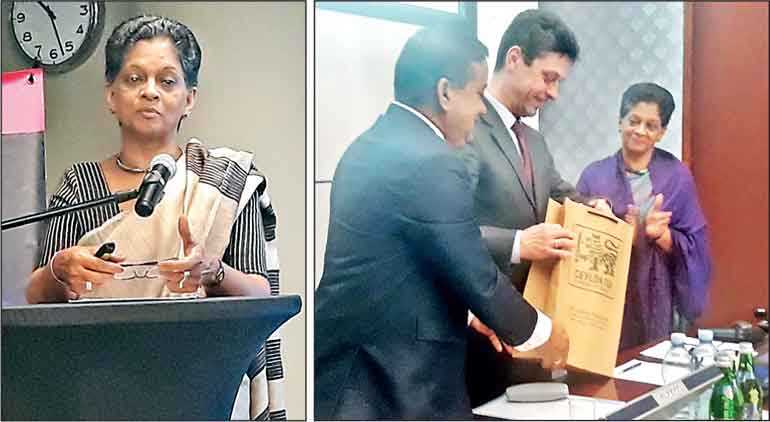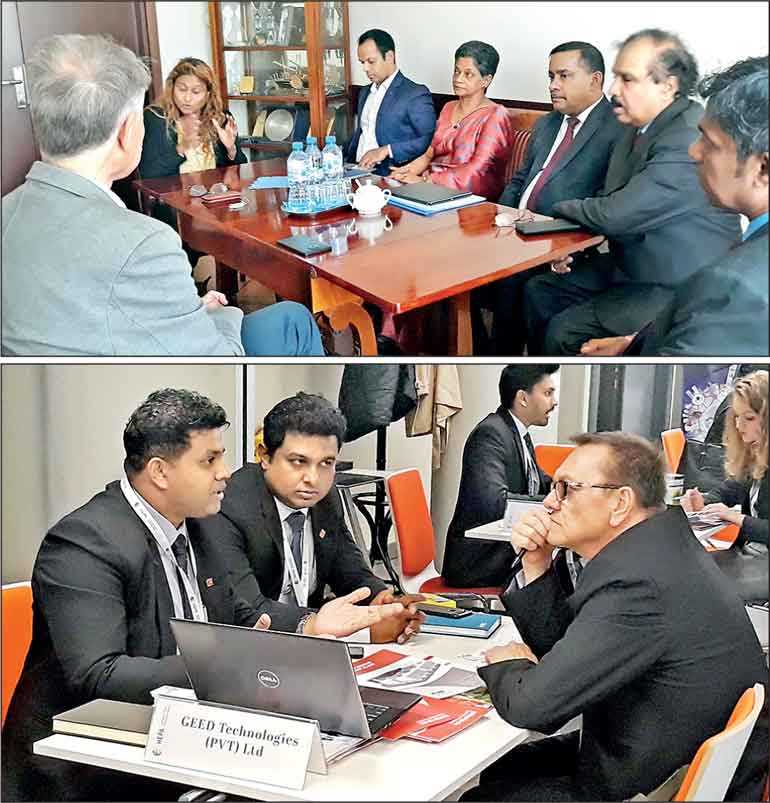Sunday Feb 22, 2026
Sunday Feb 22, 2026
Monday, 6 May 2019 00:00 - - {{hitsCtrl.values.hits}}

Sri Lanka’s share in the global export market and the contribution of exports to the national GDP has been in decline whereas imports to the country is on the increase. Further exports are dependent on imported inputs, therefore it is noted that the gap between export and import has been continuously increasing.
In addition, the export markets for Sri Lankan export products are highly concentrated. Sri Lanka’s exports were mostly dependent on the EU and North-American markets and recorded market share for USA and EU was aggregated to 60% in 2018.
The European Union, as a Region, is the number one market for Sri Lanka which represents 30% of total exports. The major export partner countries in the EU Region are UK, Germany, Belgium, Netherlands, France, and Italy.
It is important to diversify Sri Lanka’s export product basket from ‘traditional’ to ‘non-traditional’ exports. The National Export Strategy (NES) being implemented from 2018 is focusing on this matter and there are six selected product sectors to develop during the next five years aiming at diversifying the export portfolio to intensify and accelerate the economic growth.
In the above context it is important for Sri Lanka to look into new markets which will provide opportunities immediately as well as in the long run.
Why Central Europe
Central Europe is an economically important region for Sri Lanka. The potential of Central Europe remains largely untapped. This Region is much open for business and in particular attractive for long-term growth prospects. Although Sri Lanka has a strong image in the region, our commercial engagement has been relatively limited. Sri Lanka’s total bilateral trade with Central European countries is $ 810 million in 2018 with its total exports to Central Europe being $ 388 million and imports 422 million. But these figures do not tell the entire story as it contains Sri Lanka’s healthy trade relations with only few of the countries like Poland and Hungary.
Sri Lanka looks at the Central Europe primarily as a market for our own strategic industries. Sri Lanka exports tea, apparel, manufactured tobacco, rubber finished products, electrical and electronic products, coconut fibre, coconut kernel products, edible fish products, transport equipment’s and parts, coconut shell products, parts of footwear, spices, essential oils and oleoresins and processed foods to Central European Region.
Recently EU has announced its Europe-Asia connectivity strategy. It is important that Sri Lanka should now look beyond the largest EU states of Western Europe and utilise the potential of cooperation in the Central European countries which complies with the uniform market rules which apply throughout the EU.
Sri Lanka and Central European countries have much to offer to each other. There are many complementarities of interests and mutual benefits and dependencies. Central European countries have stable macro-economic environment, highly educated yet affordable workforce, favourable business environment and strategic location.
In the above context, Sri Lanka Export Development Board organised an outward trade mission to Central Europe covering Hungary and Poland. This delegation was organised parallel to the First Session of the Sri Lanka Hungary Joint Commission held in Budapest, Hungary.
Business Forum and B2B Meetings parallel to Joint Commission (JC) in Budapest, Hungary
A total of seven private companies representing sectors of food and beverage, wellness tourism, coconut products, tea and water management participated in this outward mission.
GEED Technologies, Bio Foods Ltd., Vintage Teas Ceylon Ltd., Siddalepa Exports Ltd., Serendipol Ltd., Jetwing Ltd. and Sen Wellness Sanctuary participated at the Business Forum followed by the B2B meetings held from 23-26 April in Hungary and Poland. They had the added advantage of joining the official delegation to the Joint Commission which initially provided the opportunity to organise this mission and have credibility towards the mission.
Business Forum followed by the B2B meetings held on 23 and 24 April in Hungary was organised by the Hungarian Export Promotion Agency (HEPA) and the Hungarian Embassy in New Delhi. The event was attended by the Co-Chairs of the Joint Commission; representing Sri Lanka, Secretary of the Ministry of Development Strategy and International Trade and István Joó, Deputy State Secretary for Export Development of Ministry of Foreign Affairs and Trade of Hungary H. This event was coordinated by Szolt Padazky, the Commercial Secretary of Hungary Embassy in New Delhi.
There were more than 45 Hungarian companies attended for the Forum and more than 30 B2B meetings were conducted. High interest were shown on food products, wellness tourism and coconut products.
Business Forum and B2B Meetings in Warsaw, Poland
Immediately after the Hungary program, the delegation proceeded to Poland. Poland is the largest economy in Central Europe and Eastern Europe. Poland’s population exceeds 38 million.
The Sri Lanka Embassy in Poland and the Polish Chamber of Commerce organised the Business Forums and B2B Meeting program on 25 and 26 April in Warsaw, Poland. More than 40 Polish companies attended the Business Forum and more than 40 B2B meetings were conducted on 25 and 26 April in Warsaw.
During this Outward Mission to Hungary and Poland, our participants discussed with their counterparts on different options of partnerships. It was identified that the Central European market is more affordable and a reachable market for Sri Lanka. During this Mission, the Sri Lankan trade delegation was afforded with the opportunity to develop business sales leads, joint ventures, and distributorships in both countries.
Siddhalepa Exports Ltd. Director Vidyani Hettigoda stated that they received positive interests towards Ayurvedic products, hotels and franchise sectors from the counterparts they met in Hungary and Poland and could establish a number of business contacts in both countries. Though Sri Lanka tourism industry braces for tough times, Polish companies specifically inquired for facilitation services for one to two weeks in Ayurvedic Health Resorts in Sri Lanka.
Further Hettigoda mentioned, “I saw a lot of possibilities in Poland to promote Ayurvedic products and would like to explore those and saw a lot of potential in Hungary too. I developed many contacts, and is now exchanging emails, so the relationships have begun.”
In the next few months, EDB anticipates that many of these leads will develop into formal agreements, and the EDB will continue discussions with the private sector mission participants to track their individual results.
Follow up on World Food Poland
During this visit, it was identified that participation of Sri Lankan companies in the sector of food and beverages at the World Food Poland would be beneficial to make further connections with the buyers in the Central Europe. It provides a platform to connect and conduct business with food and beverages industry buyers operating in Eastern Europe. The next World Food Poland will take place in March 2020 in Warsaw. Sri Lanka Export Development Board and Sri Lanka Embassy in Warsaw will encourage more participation from Sri Lanka at the forthcoming event.
Inaugural flight of LOT Polish Airlines
During the Business Forum held at the Polish Chamber of commerce, the representative from the LOT Polish Airlines revealed that its new seasonal service between Warsaw and Colombo is among the shortest routes from Europe and adding a connection between Europe and Sri Lanka from the next winter season, which will ‘guarantee the shortest travel’ to the destination from many European countries. This may lead to wider scope for greater economic cooperation with Sri Lanka and Poland for more trade as well as tourism. Tourist arrivals from Poland have risen by 7.5% to 9,836 in the first nine months of this year.
